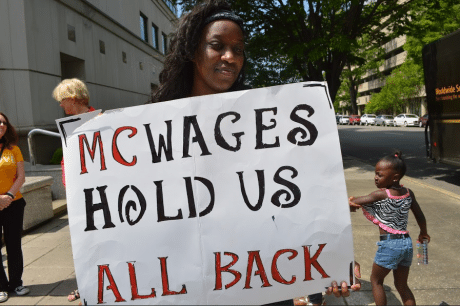When Courtney Williams got to work in the kitchen at the Rally’s in Center Point last week, it was 99 degrees inside. As he stood on the steps of the Hugo L. Black United States Courthouse shortly before a demonstration began last week, he pulled out his phone and showed a picture of the feverishly high thermostat.
“It’s been like that for two weeks now,” Williams said, lamenting his low wages and long hours as a fast food worker. What’s worse, he says, is what he feels is a stigma on people working low-wage jobs. “People want to act like it’s not a job, but it is. I’m in that hot kitchen eight hours a day and when I get my check, it’s not even enough for bills.” – Cody Owens, writing in WELD
Alabama doesn’t have a minimum wage law. The state uses the federal rate of $7.25. Earlier this year, the Birmingham City Council tried to increase the city’s minimum wage, but we overridden by a bill Governor Robert Bentley signed into law inFebruary. The bill, originally flied by Mountain Brook Republican state Rep. David Faulkner, said only the state can set the minimum wage. That move motivated a federal lawsuit filed by the NAACP against Governor Bentley and Attorney General Luther Strange, contending the law is racially motivated. For more on this, the weekly newspaper WELD visited a recent protest by Birmingham fast food employees, and WELD editor Nick Patterson tells WBHM’s Rachel Lindley workers told them.

